- Home
- Quizzes
- My Quiz Activity
- Newsletters
- Sports Betting
- MY FAVORITES
- Add Sports/Teams
- SPORTS
-
NFL
- NFL Home
- Arizona Cardinals
- Atlanta Falcons
- Baltimore Ravens
- Buffalo Bills
- Carolina Panthers
- Chicago Bears
- Cincinnati Bengals
- Cleveland Browns
- Dallas Cowboys
- Denver Broncos
- Detroit Lions
- Green Bay Packers
- Houston Texans
- Indianapolis Colts
- Jacksonville Jaguars
- Kansas City Chiefs
- Las Vegas Raiders
- Los Angeles Chargers
- Los Angeles Rams
- Miami Dolphins
- Minnesota Vikings
- New England Patriots
- New Orleans Saints
- New York Jets
- New York Giants
- Philadelphia Eagles
- Pittsburgh Steelers
- San Francisco 49ers
- Seattle Seahawks
- Tampa Bay Buccaneers
- Tennessee Titans
- Washington Commanders
-
MLB
- MLB Home
- Arizona Diamondbacks
- Atlanta Braves
- Baltimore Orioles
- Boston Red Sox
- Chicago White Sox
- Chicago Cubs
- Cincinnati Reds
- Cleveland Guardians
- Colorado Rockies
- Detroit Tigers
- Houston Astros
- Kansas City Royals
- Los Angeles Angels
- Los Angeles Dodgers
- Miami Marlins
- Milwaukee Brewers
- Minnesota Twins
- New York Yankees
- New York Mets
- Oakland Athletics
- Philadelphia Phillies
- Pittsburgh Pirates
- San Diego Padres
- San Francisco Giants
- Seattle Mariners
- St. Louis Cardinals
- Tampa Bay Rays
- Texas Rangers
- Toronto Blue Jays
- Washington Nationals
-
NBA
- NBA Home
- Atlanta Hawks
- Boston Celtics
- Brooklyn Nets
- Charlotte Hornets
- Chicago Bulls
- Cleveland Cavaliers
- Dallas Mavericks
- Denver Nuggets
- Detroit Pistons
- Golden State Warriors
- Houston Rockets
- Indiana Pacers
- Los Angeles Clippers
- Los Angeles Lakers
- Memphis Grizzlies
- Miami Heat
- Milwaukee Bucks
- Minnesota Timberwolves
- New Orleans Pelicans
- New York Knicks
- Oklahoma City Thunder
- Orlando Magic
- Philadelphia 76ers
- Phoenix Suns
- Portland Trail Blazers
- Sacramento Kings
- San Antonio Spurs
- Toronto Raptors
- Utah Jazz
- Washington Wizards
-
NHL
- NHL Home
- Anaheim Ducks
- Arizona Coyotes
- Boston Bruins
- Buffalo Sabres
- Calgary Flames
- Carolina Hurricanes
- Chicago Blackhawks
- Colorado Avalanche
- Columbus Blue Jackets
- Dallas Stars
- Detroit Red Wings
- Edmonton Oilers
- Florida Panthers
- Los Angeles Kings
- Minnesota Wild
- Montreal Canadiens
- Nashville Predators
- New Jersey Devils
- New York Islanders
- New York Rangers
- Ottawa Senators
- Philadelphia Flyers
- Pittsburgh Penguins
- San Jose Sharks
- Seattle Kraken
- St. Louis Blues
- Tampa Bay Lightning
- Toronto Maple Leafs
- Vancouver Canucks
- Vegas Golden Knights
- Washington Capitals
- Winnipeg Jets
- NCAAF
- NCAAM
- Boxing
- Entertainment
- Lifestyle
- Golf
- MMA
- Soccer
- Tennis
- Wrestling
- More Sports
- RESOURCES
- My Account
- YB on Facebook
- YB on Twitter
- YB on Flipboard
- Contact Us
- Privacy Policy
- Terms of Service
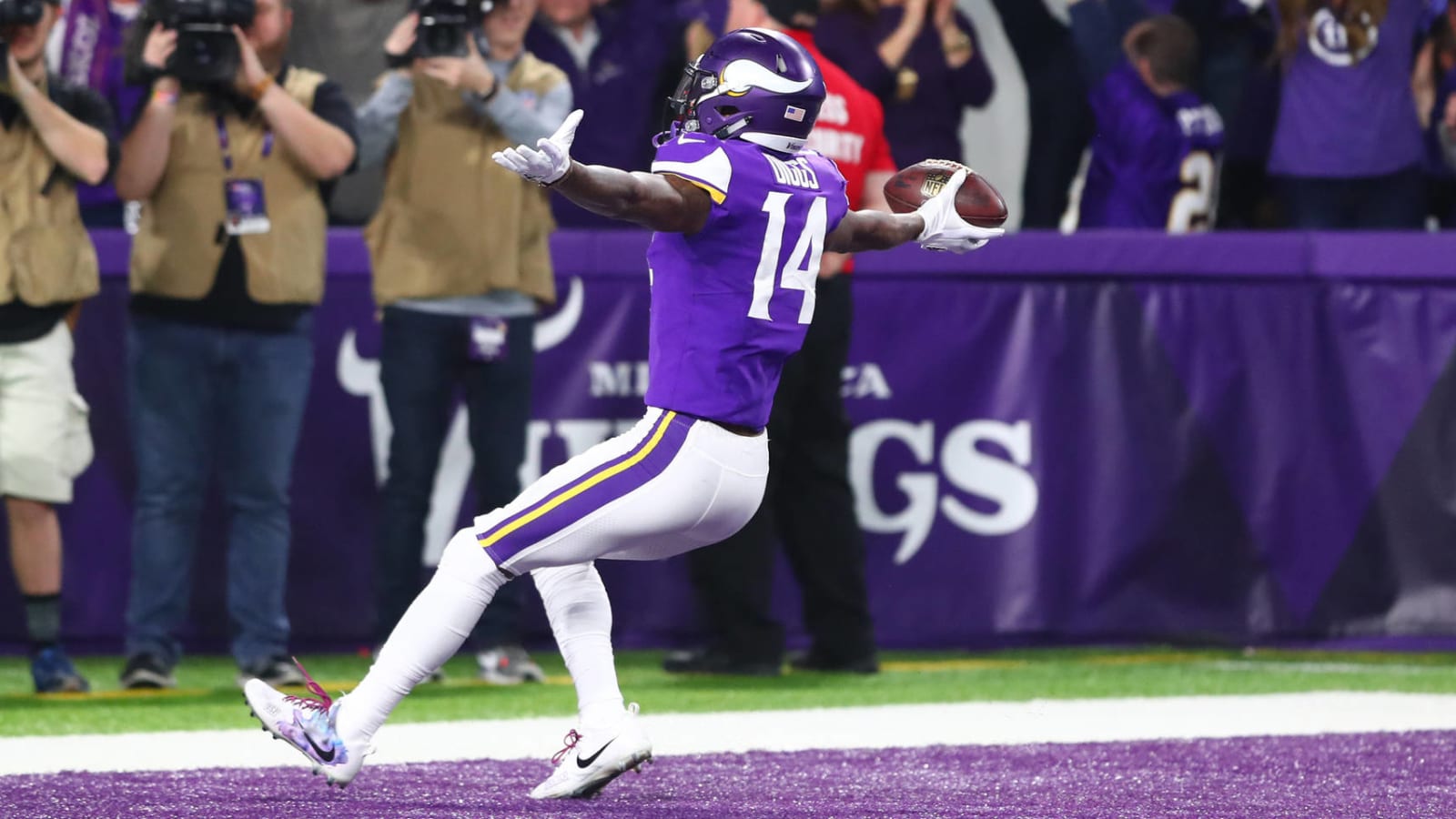
30 best NFL playoff games of all time
Eight-plus decades of NFL postseason action has produced numerous classics, giving this latest playoff field a high bar. Here are the greatest games in the history of the NFL playoffs.
30. 2002 NFC wild-card game: 49ers 39, Giants 38

This first-rounder featured seismic momentum swings and a controversial ending. Winners of four straight, the Giants countered Terrell Owens' 76-yard touchdown by scoring 31 of the next 38 points. But the Jeff Garcia-led 49ers answered by scoring the next 25 points — two touchdowns to Owens, whose three-TD day matched Amani Toomer's three-TD half. A Giants final-minute drive created a manageable field goal try for a then-young Matt Bryant. Said attempt gave way to a botched snap and an uncalled pass interference penalty on a punter's lob to an eligible-receiver guard. A wild scene, one that prompted the NFL to formally apologize to the G-Men.
29. 1972 NFC divisional playoff: Cowboys 30, 49ers 28
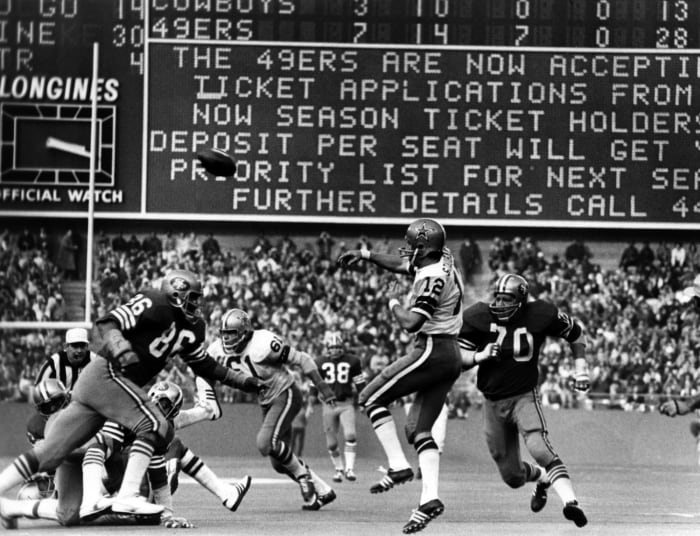
Despite Tom Landry giving Roger Staubach the reins midway through the Cowboys' 1971 Super Bowl-winning season, a preseason injury in '72 led to the legend riding the bench behind Craig Morton all year. But when the 49ers led by 15 entering the fourth quarter of the rivals' divisional-round meeting, Landry called on Staubach. After a 20-yard Staubach-to-Billy Parks TD strike with 1:20 left, kicker Toni Fritsch's unorthodox onside kick gave Dallas a game-winning shot. They capitalized via Ron Sellers' 10-yard TD catch. Even though Dallas lost to Washington the following week, this was one of Staubach's finest hours.
28. 1966 NFL championship game: Packers 34, Cowboys 27
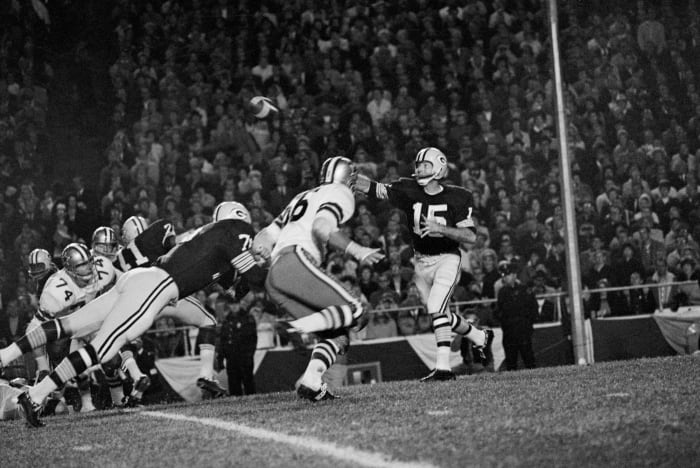
The "Ice Bowl" prequel produced more points and a far friendlier climate. A statistically superior Packers team to their 1967 edition received typically clutch work from Bart Starr, who threw four touchdown passes against the Cowboys at the Cotton Bowl. But Don Meredith's 68-yard toss to Frank Clarke pulled Dallas to within seven points in the fourth quarter, and the future "Monday Night Football" analyst marched the Cowboys to the Packers' goal line in the final seconds. But Hall of Fame linebacker Dave Robinson forced a Meredith interception to prevent overtime and send the Packers to Super Bowl I.
27. 1986 AFC championship game: Broncos 23, Browns 20, OT
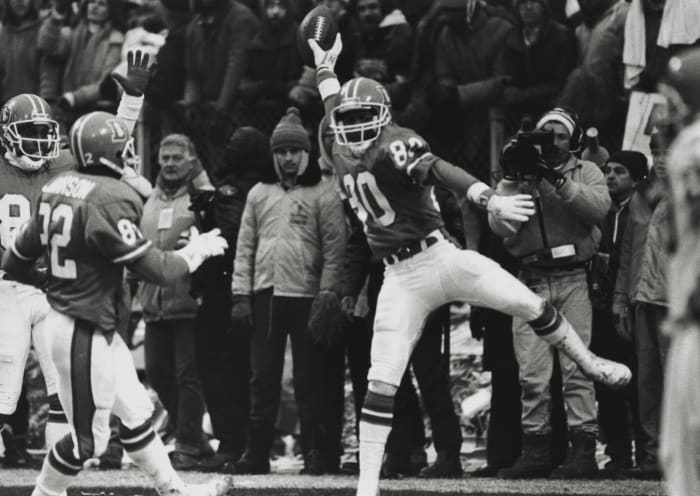
The beginning of John Elway's ascent into his position as an all-time great involved a 98-yard drive and some clutch work by a then-drop-prone rookie wide receiver. Mark Jackson's only two catches came on a third-and-18 to keep Denver's drive going and then on Elway's rocket to tie the game with 37 seconds left. Coming off a double-overtime comeback win over the Jets, the top-seeded Browns went up 20-13 on Brian Brennan's 48-yard TD catch. After Jackson's answer concluded "The Drive" and forced overtime, the Broncos advanced to Super Bowl XXI on a still-debated field goal from barefooted kicker Rich Karlis.
26. 1933 NFL championship game: Bears 23, Giants 21

The NFL's first true championship game still holds the distinction of having the most lead changes in a title contest. The league split into two divisions in 1933, and the Bears and Giants faced off in the first of their six championship encounters. Despite offensive football being in its infancy, this matchup produced 618 yards of offense and six lead changes. Two came on second-half Bill Karr TDs, the first on a jump pass from Bronko Nagurski and the second at the end of a fourth-quarter lateral sequence. George Halas' Bears won four of their six championship meetings with the Giants from 1933-63.
25. 2012 AFC divisional playoff: Ravens 38, Broncos 35, 2OT

The No. 1-seeded Broncos allowed future Bronco Joe Flacco to complete a 70-yard bomb to Jacoby Jones that sent this game to overtime. Flacco's heave came with 30 seconds left and the Ravens out of timeouts, and it obscured one of the great return days in NFL history. Ex-LSU sprinter Trindon Holliday took a punt and kickoff back for touchdowns, and Peyton Manning threw three TD passes on a bitter-cold day in the NFL's fourth-longest game. Rahim Moore's gaffe (and Justin Tucker's double-overtime game-winner) likely deprived the Broncos of a Super Bowl trip and instead catalyzed a Ravens championship climb.
24. Super Bowl XXIII: 49ers 20, Bengals 16

The most vulnerable of the 49ers' four 1980s Super Bowl teams, the 1988 edition prevailed in an oft-replayed finish. The 49ers (10-6) held the 12-4 Bengals' No. 1 offense to nine points but surrendered a 93-yard Stanford Jennings kick-return TD in the third quarter. During the Super Bowl's premier wide receiver night, Jerry Rice turned 14 of his 215 yards into a game-tying score. After Jim Breech's field goal broke a 13-all tie, Joe Montana broke the Bengals with one of the great drives in NFL history. The 49ers' 11-play, 92-yard march ended with a John Taylor touchdown, dashing the Bengals' best title shot.
23. 2018 AFC championship game: Patriots 37, Chiefs 31, OT

This old guard-new challenger showdown may age well, as Patrick Mahomes moves up the all-time QB ladder. Bill Belichick and Brian Flores' defense shut out the breakout superstar in the first half, but the MVP's second-half showing almost brought a baton pass. The Patriots minimized Tyreek Hill but could not stop the rest of the Chiefs' machine-gun attack in a 24-point K.C. fourth quarter. However, the Pats converted 13 third downs. While two controversial fourth-stanza plays went against the Chiefs before Dee Ford committed one of the costliest penalties ever, their vulnerable secondary could not stop Tom Brady in regulation or OT.
22. 1977 AFC divisional playoff: Raiders 37, Colts 31, 2OT

One of the storied moments in the history of the tight end position propelled the Raiders to their 10th AFL or AFC championship game in 11 years. Dave Casper caught three touchdown passes in Oakland's win at Baltimore's Memorial Stadium, but his only non-TD catch — a 42-yarder on the Raiders' game-tying fourth-quarter drive — immortalized this as the "Ghost to the Post" game. It featured eight lead changes, with Ken Stabler's 345 yards besting reigning MVP Bert Jones. "The Snake" found Casper for a 10-yard touchdown in the second overtime to send the Raiders to the AFC title game.
21. 2017 NFC divisional playoff: Vikings 29, Saints 24

Stefon Diggs' "Minneapolis Miracle" walk-off sprint overshadowed a back-and-forth classic. Using their sixth starting quarterback in their past six playoff seasons, the No. 2-seeded Vikings ran out to a 17-0 halftime lead but saw their top-tier defense fail to derail Drew Brees. The future Hall of Famer threw three second-half touchdown passes in a six-score fourth quarter. The Vikings then went up 23-21 with 1:29 left, and the Saints countered with an apparent game-winning field goal barely a minute later. Somehow, the Case Keenum-to-Diggs sequence was only the second-most brutal Saints loss of the 2010s.
20. Super Bowl XXXIV: Rams 23, Titans 16

The first Super Bowl in Oilers/Titans history involved two 16-point runs, the second of which pulling the AFC champions to a late-fourth-quarter tie. Tennessee, however, could not stop 1999 MVP Kurt Warner on a then-Super Bowl-record 414-yard night. His final pass, a 73-yard Isaac Bruce touchdown, broke the tie. The Titans' final drive cemented this game's classic status. Steve McNair marched his troops to the Rams' 6-yard line, finishing off that stretch with one of the Super Bowl's great individual efforts . But Rams linebacker Mike Jones' subsequent goal-line tackle on Kevin Dyson denied the Titans on the game's final play.
19. 1999 AFC wild-card game: Titans 22, Bills 16
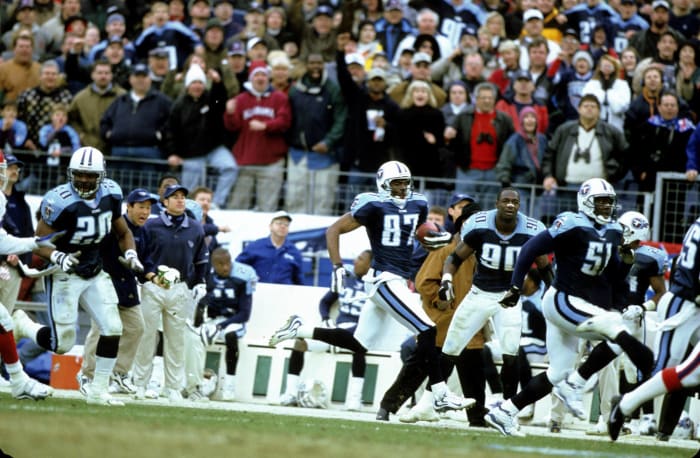
Shifting to happier Titans times...this first-round escape propelled them to Super Bowl XXXIV. In what turned out to be the final game of the Bruce Smith-Thurman Thomas-Andre Reed era, the Bills made the controversial decision to bench Doug Flutie for the less proven Rob Johnson. The latter did not play particularly poorly, leading two go-ahead fourth-quarter drives. The second involved a shoeless completion to Peerless Price, setting up a Steve Christie field goal with 25 seconds left. Kevin Dyson was a backup option on Tennessee's "Music City Miracle" play, but his name lives on because of the result.
18. 1971 AFC divisional playoff: Dolphins 27, Chiefs 24, 2OT

At 82 minutes, 40 seconds, this is the longest game in NFL history. Kansas City received a monumental all-purpose-yard effort from Ed Podolak, who was not a key player on the Chiefs' Super Bowl IV team. Podolak amassed a playoff-record 350 yards. It was not enough. The Dolphins rallied to send the game to overtime via Bob Griese's 5-yard pass to Marv Fleming. Hall of Fame Chiefs kicker Jan Stenerud missed a 31-yard field goal, leading to overtime, then had an OT try blocked. Garo Yepremian fared better, making the game-winner. It took the Chiefs two decades to return to the divisional round.
17. 2015 NFC divisional playoff: Cardinals 26, Packers 20, OT

This game would be well off this elite tier had the Cardinals simply stopped a fourth-and-20 Packers sequence. But Aaron Rodgers' two subsequent Hail Mary heaves to undrafted wideout Jeff Janis etch this game into postseason lore. A ricochet TD from Carson Palmer to Michael Floyd gave the Cardinals a late lead, but Arizona's defense could not prevent Rodgers from two historic conversions without Jordy Nelson or Randall Cobb available. However, Playoff Larry Fitzgerald's legend grew with his 80 overtime yards, making 2015 the second straight year the Packers were eliminated in OT without Rodgers touching the ball.
16. Super Bowl XXXVI: Patriots 20, Rams 17

A Rams offense featuring the MVPs from 1999-2001 (Kurt Warner and Marshall Faulk) struggled to get going against Bill Belichick's defense. New England limited St. Louis' No. 1 offense to three points before the fourth quarter, with Ty Law's pick-six putting the 14-point favorites on notice. But Warner piloted two final-period TD drives, the latter ending with the first of Ricky Proehl's " scored too soon against the Patriots" Super Bowl TDs. Tom Brady threw for just 92 yards before the Pats' final drive, but the first-year starter set up the first of Adam Vinatieri's two Super Bowl game-winners.
15. Super Bowl XXV: Giants 20, Bills 19
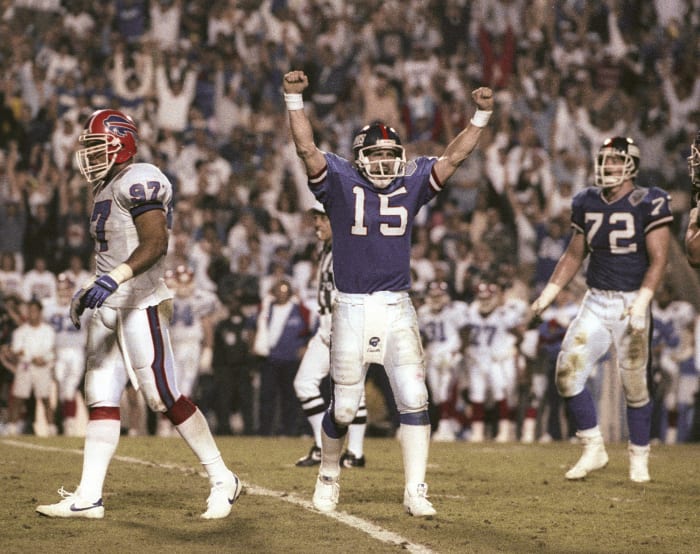
Possessing the ball for over 40 minutes, the Giants did just enough to ground the 1990 Bills' high-flying K-Gun offense. However, Thurman Thomas still totaled 190 scrimmage yards and gave Buffalo a 19-17 lead via a 31-yard fourth-quarter touchdown run. This game also featured a Bruce Smith safety and Mark Ingram's five-broken-tackle third-down conversion during the Giants' near-nine-minute third-quarter TD drive. After Matt Bahr's go-ahead field goal, the Bills could not move into sufficient field goal range for Scott Norwood. His 47-yard miss is the lasting image from Buffalo's early-1990s near dynasty.
14. 2011 NFC divisional playoff: 49ers 36, Saints 32

The NFL's recent unveiling of its "100 Greatest Games" list placed this 64th. Too low. Because in the fourth quarter's final four minutes, a 23-17 game morphed into an all-action classic. Drew Brees (462 yards) and Alex Smith traded long scoring plays, with Jimmy Graham's 66-yarder giving New Orleans a 32-29 edge. Graham and Vernon Davis combined for a tight end duel for the ages — 12 catches, 283 yards, four TDs between them — but the elder pass catcher won the day. Davis' third-down score with 9 seconds left sent the 49ers to the NFC championship game. January did not go well for the 2010s Saints.
13. 1987 AFC championship game: Broncos 38, Browns 33

This game's unique ending has obscured a high-octane contest. John Elway and Bernie Kosar each threw three touchdown passes, and Earnest Byner was the best player on the field for most of the day. His 183 scrimmage yards and two touchdowns helped Cleveland erase a 28-10 Denver lead, but after the Browns tied it at 31 in the fourth quarter, Elway drove the Broncos 77 yards in three plays. Sammy Winder's catch-and-run provided the decisive points. Jeremiah Castille's strip of a sure Byner TD gave the game its identity ("The Fumble"), however, and the Browns have not come this close to a Super Bowl since.
12. 2006 AFC championship game: Colts 38, Patriots 34

After losing the first of his four AFC title game matchups with Tom Brady, Peyton Manning won the final three. The Colts' comeback from an 18-point first-half deficit made the second meeting the most memorable. While the game between the AFC's Nos. 3-4 seeds features a confusing box score with three lineman touchdowns, Manning's 349-yard day led was enough to turn the tide against the Patriots. Indianapolis navigated a Reggie Wayne near-fumble on its game-winning drive, and after Joseph Addai's TD, a Marlin Jackson interception sealed the Colts' trip to Super Bowl XLI.
11. Super Bowl XLIII: Steelers 27, Cardinals 23
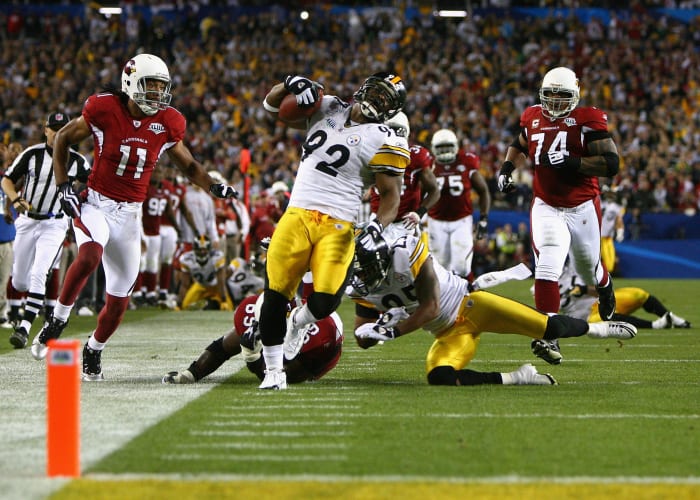
Thanks to Larry Fitzgerald's record seven playoff touchdown receptions, the 2008 Cardinals transformed from 9-7 into a postseason menace. This game progressed slowly, but James Harrison's 100-yard all-or-nothing INT return provided a massive swing for the Steelers. However, Pittsburgh was no match for Fitz in the fourth quarter. The second of the future Hall of Famer's two scores completed a Cardinals 13-point comeback. But MVP Santonio Holmes carried the Steelers to victory, recording 73 yards and the game-winning touchdown on the ensuing drive. Another 300-plus-yard Kurt Warner Super Bowl effort went for naught.
10. 1992 AFC wild-card game: Bills 41, Oilers 38, OT

Not only did the Bills not have Jim Kelly in this game, but they also lost Thurman Thomas midway through. Frank Reich nevertheless led the greatest comeback in league history — a 32-point rally over an Oilers team that beat Buffalo a week before. Warren Moon threw four first-half TD passes, but Jack Pardee's Run and Shoot attack cooled after amassing a seemingly bulletproof 35-3 lead. Reich found Andre Reed three times in the second half to give the Bills a 38-35 lead. While Moon helped the Oilers salvage OT, Nate Odomes' extra-period INT set up Steve Christie's game-winning field goal to start another Bills Super Bowl run.
9. 1958 NFL championship game: Colts 23, Giants 17, OT

Although Johnny Unitas and Raymond Berry were masterful in "The Greatest Game Ever Played," the contest itself did not match the legendary duo's work. The Colts and Giants combined for six lost fumbles at Yankee Stadium that day, but the game brought momentous swings. The Giants erased a 14-3 deficit via Charlie Conerly's 15-yard pass to Frank Gifford, but Unitas directed a game-tying drive that left players confused when a field goal knotted the score at regulation's end. The first sudden-death playoff game ended after the Colts, who did not win the OT coin toss, marched 79 yards to set up Alan Ameche's 1-yard TD.
8. Super Bowl LI: Patriots 34, Falcons 28, OT
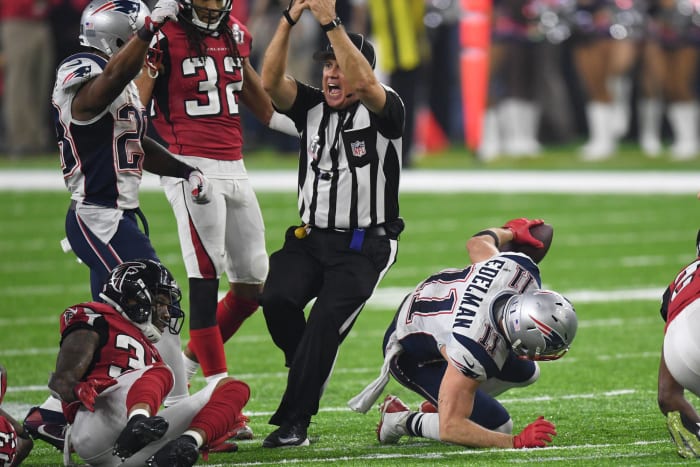
This Falcons unraveling remains stupefying. Kyle Shanahan's offense still moved the ball mid-collapse but could not score any points after the floodgates opened. The signature game for Tom Brady's GOAT case featured the Patriots icon throwing a pick-six in falling behind 28-3 and atoning for it with a masterful fourth quarter. The Falcons twice backed themselves out of field goal range, via penalty, and the Pats did not let them off the hook in what became the NFL's most crushing loss. Brady threw for 466 yards against a shell-shocked defense and guided the overtime walk-off drive that James White punctuated with his third TD.
7. 1974 AFC divisional playoff: Raiders 28, Dolphins 26

Known for the conclusion of the Dolphins' dynasty and Clarence Davis' storied touchdown catch, the "Sea of Hands" game also featured acrobatic touchdown receptions from Fred Biletnikoff and Cliff Branch. Ken Stabler threw four touchdown passes and needed all four to stave off the three-time reigning AFC champions. Dolphins rookie running back Benny Malone's go-ahead score gave the visitors a 26-21 lead, but Stabler drove the Raiders into the red zone. His final-minute, 8-yard lob to Davis, a running back who caught four passes all season, remains one of the NFL's signature plays.
6. 1950 NFL championship game: Browns 30, Rams 28

This subplot-filled game deserves more attention. The Browns' first NFL season ended with them facing Cleveland's former team for the title. The Rams possessed an otherworldly offense that averaged 37 points per game. In a matchup featuring numerous Hall of Famers, the Rams, led by ex-Cleveland Rams QB Bob Waterfield, countered the first three of Otto Graham's four TD passes to take a 28-20 lead at Cleveland Municipal Stadium. But Graham mounted two scoring drives, converting a fourth-and-19 on the Browns' final possession to set up Lou Groza's 16-yard field goal. Graham and Waterfield combined for 610 passing yards.
5. 1981 NFC championship game: 49ers 28, Cowboys 27

Like the 1958 title game, 1981's NFC decider was a turnover mess. The 49ers and Cowboys combined for nine, the hosts committing six. Still, San Francisco's defense helped set up its offense for a rather notable NFL moment. The drive itself was not as surgical as Joe Montana's Super Bowl XXIII sojourn, with the 49ers running frequently against the Cowboys' dime defense. Obviously, San Francisco's march ended with an iconic reception — "The Catch," courtesy of Dwight Clark — but 49ers cornerback Eric Wright narrowly preventing Drew Pearson from a stunning counter strike adds appeal to this classic.
4. Super Bowl XLIX: Patriots 28, Seahawks 24

A fantastic Super Bowl before the Seahawks' infamous goal-line decision, this game played out as essentially a battle for team of the 2010s. Tom Brady threw touchdown passes to four targets, but his two interceptions helped the Seahawks establish a 10-point, fourth-quarter lead. Seattle's injury-plagued secondary, however, could not hold up. Julian Edelman's TD gave the Pats the final lead. A slight what-if before the massive Marshawn Lynch what-if: Does Jermaine Kearse score if he gets up immediately after his circus catch? That became key, because Malcolm Butler's ensuing INT changed the course of these franchises.
3. 1967 NFL championship game: Packers 21, Cowboys 17

Still the coldest game in NFL history, temperature-wise (minus-13 degrees), the "Ice Bowl" doubles as the defining day for the Packers dynasty. The game involved two long touchdown passes — the second a Dan Reeves-to-Lance Rentzel 50-yard halfback pass — and the Cowboys reeling off 17 straight points to take a fourth-quarter lead. Bart Starr's storied drive included one of the boldest decisions in NFL history. Vince Lombardi called for a third-down QB sneak without a timeout and 16 seconds remaining. Starr prevented an end-game catastrophe by plunging into the end zone to send the Packers to Super Bowl II.
2. Super Bowl XLII: Giants 17, Patriots 14

This century's defining game lands here despite its low score. The 2007 championship's stakes — the Giants denying the Patriots open-and-shut "greatest team ever" status — and final moments elevate this defensive battle's standing. Tom Brady's methodical 80-yard drive that ended with an easy Randy Moss TD gave the Pats a glimpse at 19-0. But Eli Manning's 83-yard answer combining seminal standard football sequences with David Tyree raising the big-stage degree-of-difficulty bar to a stunning place makes this Super Bowl one of the league's most important nights. So much happened in these final moments that Plaxico Burress' clincher is an afterthought — a sign this game was pretty good.
1. 1981 AFC divisional playoff: Chargers 41, Dolphins 38, OT
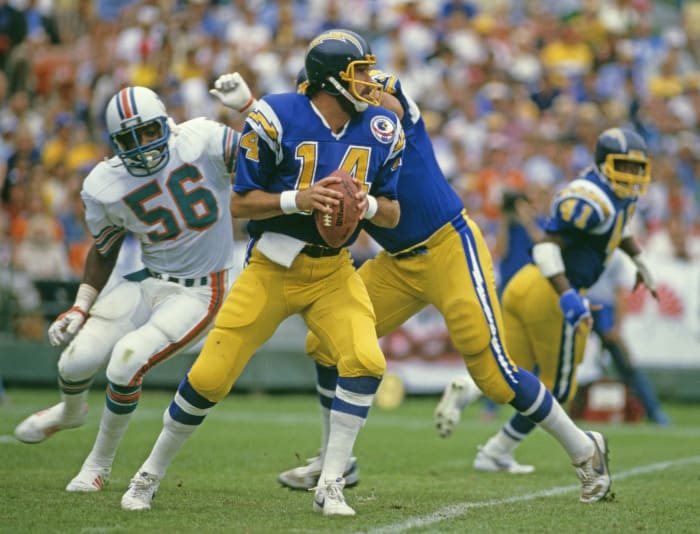
A true stunner. Dan Fouts and Dolphins backup Don Strock combined for 836 passing yards and seven touchdowns. The Chargers blew a 24-0 lead and needed a late strip, a fluky Fouts-to-James Brooks final-minute touchdown and a Kellen Winslow blocked field goal to send this second-round game to overtime. This night also included Miami's half-ending hook-and-ladder — a Duriel Harris-to-Tony Nathan flip — and Winslow playing through injury en route to a then-playoff-record 13-catch night. Rolf Benirschke's 29-yard field goal sent the Bolts to Cincinnati, where they lost the coldest wind-chill game ever. Nevertheless, the "Epic in Miami" was Air Coryell's pinnacle and the NFL's signature shootout.
Sam Robinson is a Kansas City, Mo.-based writer who mostly writes about the NFL. He has covered sports for nearly 10 years. Boxing, the Royals and Pandora stations featuring female rock protagonists are some of his go-tos. Occasionally interesting tweets @SRobinson25.
More must-reads:
- Lions sign veteran defensive tackle
- Legendary Broncos DC Joe Collier dead at 91
- The 'NFL MVP runners-up' quiz
Breaking News
Customize Your Newsletter
 +
+
Get the latest news and rumors, customized to your favorite sports and teams. Emailed daily. Always free!
Use of this website (including any and all parts and
components) constitutes your acceptance of these
Terms of Service and Privacy Policy.

